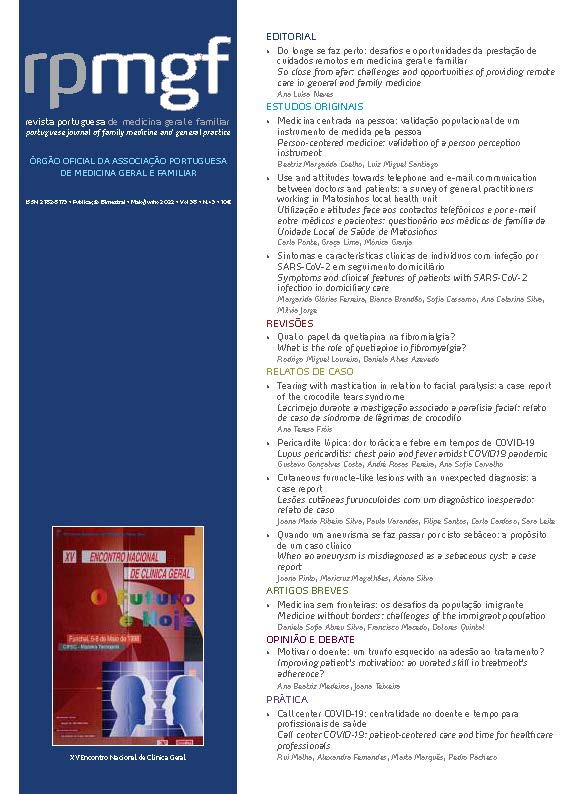Person-centered medicine: validation of a person perception instrument
DOI:
https://doi.org/10.32385/rpmgf.v38i3.13218Keywords:
Person-centered medicine, Cross-cultural adaptation, Validation, Questionnaire, Medical appointmentAbstract
Aims: Culturally adapt and validate for the European spoken Portuguese the Patient Perception of Patient-Centeredness (PPPC) questionnaire, created by Moira Stewart with an internal consistency of 0.80 (Cronbach’s alpha).
Methods: PPPC translation to Portuguese (PCCP), medical experts’ analysis, back-translation, and degree of readability measurement were performed. A cross-sectional multicentric observational quasi-randomised study was performed in a convenience sample of patients attending their family medicine appointments, who accepted applying the PCCP and answering sample characterization parameters such as gender, age, and academic background. Internal consistency by Cronbach’s alpha as well as the descriptive and inferential statistical analysis was performed to a threshold of significance of p<0.01.
Results: PCCP has demonstrated an acceptable internal consistency with Cronbach’s alpha=0.72, ranging from 0.691 to 0.72, being the item-total correlations between 0.32-0.65, F-test of F=32343.09, p<0.001, and reliability of ρ=0.96; p<0.001. The Flesch Reading Ease found an easy-to-read level of readability. For an n=570, 36.8% were women, 17.0% were under 35 years old and 48.9% had a six-year educational level, minimum 13 and maximum 36 points. No differences were found by gender (p=0.73), age (p=0.57), or educational level (p=0.44) for the mean score of the PCCP.
Conclusions: The PCCP questionnaire was able to be cross-culturally adapted and proved to be easy to read. It revealed an adequate internal consistency (α=0.72), though smaller than the original one (α=0.80). It is now possible to study the patient's perception of the practice of a PCM.
Downloads
References
Sacristán JA. Patient-centered medicine and patient-oriented research: Improving health outcomes for individual patients. BMC Med Inform Decis Mak. 2013;13:6.
Fuzikawa AK. O método clínico centrado na pessoa: um resumo [Internet]. Belo Horizonte: [s.n.]; 2013. Available from: https://www.nescon.medicina.ufmg.br/biblioteca/imagem/3934.pdf
Armstrong D. The invention of patient-centred medicine. Soc Theory Health. 2011;9(4):410-8.
Santiago LM, Simões JA, Vale M, Faria E, Ferreira PL, Rosendo I. Auto perceção do desempenho da medicina centrada na pessoa em medicina geral e familiar: criação de um instrumento de medição [Self-awareness of performing patient-centered medicine in general practice / family medicine: development of a measurement scale]. Acta Med Port. 2020;33(6):407-14. Portuguese
Ribeiro MM, Amaral CF. Medicina centrada no paciente e ensino médico: a importância do cuidado com a pessoa e o poder médico [Patient-centered care and medical teaching: the importance of caring and sharing]. Rev Bras Educ Med. 2008;32(1):90-7. Portuguese
Stewart M, Brown JB, Weston WW, McWhinney IR, McWilliam CL, Freeman TR. Medicina centrada na pessoa: transformando o método clínico. 3a ed. São Paulo: Artmed; 2017. ISBN 9788582714249
Rathert C, Wyrwich MD, Boren SA. Patient-centered care and outcomes: a systematic review of the literature. Med Care Res Rev. 2013;70(4):351-79.
Hudon C, Fortin M, Haggerty JL, Lambert M, Poitras ME. Measuring patients’ perceptions of patient-centered care: a systematic review of tools for family medicine. Ann Fam Med. 2011;9(2):155-64.
Santiago LM, Reis AF, Botas PC, Pereira CD. Medicina centrada no paciente e capacitação do consulente medicina geral e familiar [Patient-centered medicine and enablement in the general practice / family medicine setting]. Rev ADSO. 2015;3(5):19-32. Portuguese
Rodrigues TF. Medicina centrada na pessoa: validação concorrente com capacitação [dissertation]. Coimbra: Faculdade de Medicina da Universidade de Coimbra; 2019. Available from: http://hdl.handle.net/10316/89638
Teixeira JP. Medicina centrada na pessoa: validação concorrente com qualidade de vida [dissertation]. Coimbra: Faculdade de Medicina da Universidade de Coimbra; 2019. Available from: http://hdl.handle.net/10316/89577
Rodrigues TJ. Medicina centrada na pessoa: validação concorrente com empatia [dissertation]. Coimbra: Faculdade de Medicina da Universidade de Coimbra; 2019. Available from: http://hdl.handle.net/10316/89895
Sousa VD, Rojjanasrirat W. Translation, adaptation and validation of instruments or scales for use in cross-cultural health care research: a clear and user-friendly guideline. J Eval Clin Pract. 2011;17(2):268-74.
Tavakol M, Dennick R. Making sense of Cronbach’s alpha. Int J Med Educ. 2011;2:53-5.
EUROSTAT. Population by educational attainment level, sex and age (%): main indicators [homepage]. Luxembourg: Data.Europe.eu; 2021 [updated 2021 Oct 18; cited 2021 Mar 9]. Available from: https://data.europa.eu/euodp/pt/data/dataset/HA5UsYsTAfaaAzvTpow
Bertakis KD, Franks P, Epstein RM. Patient-centered communication in primary care: physician and patient gender and gender concordance. J Womens Health. 2009;18(4):539-45.
Bertakis KD, Azari R. Patient gender and physician practice style. J Womens Health. 2007;16(6):859-68.
Bertakis KD, Azari R. Patient-centered care: the influence of patient and resident physician gender and gender concordance in primary care. J Womens Health. 2012;21(3):326-33.
Kuluski K, Reid RJ, Baker GR. Applying the principles of adaptive leadership to person-centred care for people with complex care needs: considerations for care providers, patients, caregivers and organizations. Health Expect. 2021;24(2):175-81.
Downloads
Published
Issue
Section
License
Copyright (c) 2022 Portuguese Journal of Family Medicine and General Practice

This work is licensed under a Creative Commons Attribution-NonCommercial-NoDerivatives 4.0 International License.
The authors will assign to the RPMGF the sole right to publish and distribute the content of the manuscript specified in this declaration via physical, electronic, broadcasting or any other medium that may come into existence. They also grant the RPMGF the right to use and exploit this manuscript, in particular by assigning, selling or licensing its content. This permission is permanent and takes effect from the moment the manuscript is submitted, has the maximum duration allowed by applicable Portuguese or international law and is of worldwide scope. The authors further declare that this assignment is made free of charge. If the RPMGF informs the authors that it is not going to publish their manuscript, the exclusive assignment of rights ceases forthwith.
The authors authorise the RPMGF (or any entity it may appoint) to act on their behalf when it believes that copyright may have been infringed.





